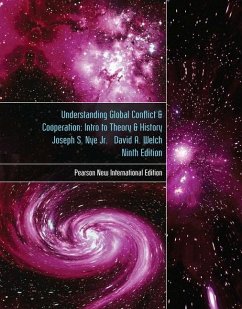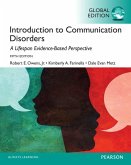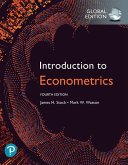Written by celebrated scholar Joseph Nye and new co-author David Welch, Understanding Global Conflict and Cooperation is a concise and penetrating introduction to world politics in an era of complex interdependence.
This text employs lessons from theory and history to examine conflict and cooperating among global actors and thus to provide readers with a durable analytical framework. From twentieth and twenty-first century wars to global finance and global governance, Understanding Global Conflict and Cooperation, formerly known as Understanding International Conflicts, expands substantially on a classic work and continues to deliver a thought-provoking survey of international relations today.
Features + Benefits
· Employs an analytical framework that pulls from history, theory, and policy to help students fully understand the complexities of world affairs in two ways. The first is an emphasis that conflict and cooperation are two sides of the same problem: namely, resolving disputes. The second is an emphasis that pressing problems are decreasingly international and increasingly global; interstate conflict is still an important problem but conflict within states is now more common than between states and it almost always reverberates internationally. (ex. p. vi)
· Introduces three major theoretical paradigms—realism, liberalism, and constructivism—and discusses how each can or cannot explain conflict and cooperation among international actors. (ex. p. 62)
· Explores international politics throughout the 20th and 21st centuries, comprehensively surveying everything from wars among great powers to the rise of globalization and complex interdependence. (ex. Ch. 7)
· Poses normative questions to help students consider practical answers to how actors should approach problems in international politics.
· Features chronologies, primary source excerpts, maps, and photos to deepen the historical context and to enliven the text. (ex. p. 34)
· Includes an extensive list of suggested reading to help both instructors and students build on the ideas presented in the text.
Chapter 1. Are There Enduring Logics of Cooperation in World Politics?
Chapter 2. Explaining Conflict and Cooperation: Tools and Techniques of the Trade
Chapter 3. From Westphalia to World War I
Chapter 4. The Failure of Collective Security and World War II
Chapter 5. The Cold War
Chapter 6. Post-Cold War Cooperation, Conflict, Flashpoints
Chapter 7. Globalization and Interdependence
Chapter 8. The Information Revolution and Transnational Actors
Chapter 9. What Can We Expect in the Future?
Hinweis: Dieser Artikel kann nur an eine deutsche Lieferadresse ausgeliefert werden.
This text employs lessons from theory and history to examine conflict and cooperating among global actors and thus to provide readers with a durable analytical framework. From twentieth and twenty-first century wars to global finance and global governance, Understanding Global Conflict and Cooperation, formerly known as Understanding International Conflicts, expands substantially on a classic work and continues to deliver a thought-provoking survey of international relations today.
Features + Benefits
· Employs an analytical framework that pulls from history, theory, and policy to help students fully understand the complexities of world affairs in two ways. The first is an emphasis that conflict and cooperation are two sides of the same problem: namely, resolving disputes. The second is an emphasis that pressing problems are decreasingly international and increasingly global; interstate conflict is still an important problem but conflict within states is now more common than between states and it almost always reverberates internationally. (ex. p. vi)
· Introduces three major theoretical paradigms—realism, liberalism, and constructivism—and discusses how each can or cannot explain conflict and cooperation among international actors. (ex. p. 62)
· Explores international politics throughout the 20th and 21st centuries, comprehensively surveying everything from wars among great powers to the rise of globalization and complex interdependence. (ex. Ch. 7)
· Poses normative questions to help students consider practical answers to how actors should approach problems in international politics.
· Features chronologies, primary source excerpts, maps, and photos to deepen the historical context and to enliven the text. (ex. p. 34)
· Includes an extensive list of suggested reading to help both instructors and students build on the ideas presented in the text.
Chapter 1. Are There Enduring Logics of Cooperation in World Politics?
Chapter 2. Explaining Conflict and Cooperation: Tools and Techniques of the Trade
Chapter 3. From Westphalia to World War I
Chapter 4. The Failure of Collective Security and World War II
Chapter 5. The Cold War
Chapter 6. Post-Cold War Cooperation, Conflict, Flashpoints
Chapter 7. Globalization and Interdependence
Chapter 8. The Information Revolution and Transnational Actors
Chapter 9. What Can We Expect in the Future?
Hinweis: Dieser Artikel kann nur an eine deutsche Lieferadresse ausgeliefert werden.








